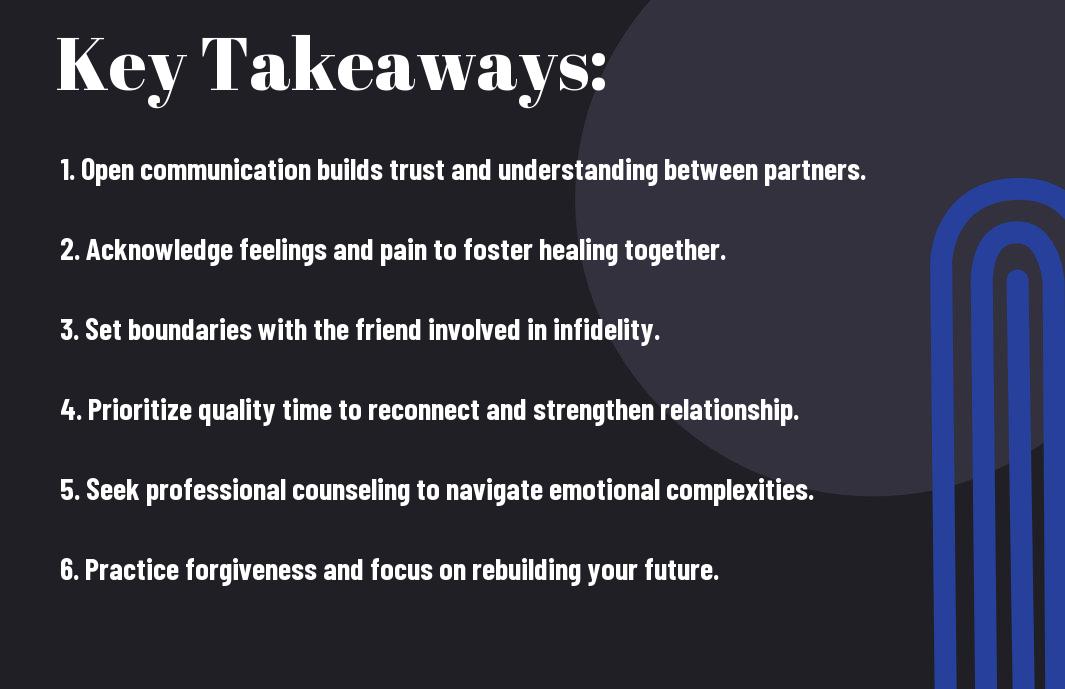Infidelity can shatter your relationship, especially when it involves a trusted friend. The betrayal may leave you feeling devastated and unsure of how to move forward. However, with dedication and open communication, you can begin on a journey towards healing. This blog post will guide you through the imperative steps to recover from this painful experience, enabling you and your partner to rebuild trust and strengthen your marriage. Let’s explore practical strategies that can pave the way for recovery and renewed intimacy.
Key Takeaways:
- Infidelity can severely damage trust, but recovery is possible with commitment from both partners.
- Open and honest communication about feelings and actions is vital for rebuilding trust.
- Seek professional help, such as couples therapy, to navigate the complexities of the healing process.
- Establish clear boundaries regarding friendships, especially with the person involved in the infidelity.
- Focus on rebuilding connection and intimacy through shared experiences and quality time together.
- Be patient; healing takes time, and both partners must invest effort to rebuild the relationship.
- Explore underlying issues that may have contributed to the infidelity to prevent future problems.

Understanding Infidelity
A deep understanding of infidelity is crucial for healing and moving forward. Infidelity can take various forms, including emotional, physical, or even online connections that compromise the trust and commitment shared between partners. Recognizing the dynamics at play helps you navigate the complex emotions that arise, ultimately guiding you toward recovery and renewed intimacy.
Defining Infidelity
Beside the conventional notions of cheating, infidelity encompasses a range of behaviors that betray the trust within your relationship. This can include secretive communications, emotional attachments to friends, or engaging in physical relationships without consent from your partner. Understanding what constitutes infidelity in your specific connection is vital for addressing the underlying issues.
The Impact of Betrayal
Infidelity leaves a significant mark on relationships and can trigger a cascade of emotional responses. Feelings of *hurt*, *anger*, and *betrayal* flood your mind, shaking the very foundation of your partnership. You may experience a sense of *loss* accompanied by insecurity and doubt. The emotional scars can disrupt not just your bond, but also your mental well-being as you grapple with feelings of *shame*, *jealousy*, and even *fear of abandonment*.
The emotional turmoil resulting from betrayal can lead to severe consequences in your relationship. The loss of *trust* takes time to rebuild, while feelings of *resentment* can linger, complicating your interactions. You may also notice a shift in your ability to feel secure and connected with your partner. By acknowledging the depth of this impact, you can begin to confront the emotional fallout and take steps towards healing. It’s vital to focus on open communication and understanding as you work through the *damage* caused by the infidelity, allowing space for healing and renewing your commitment.

The Emotional Journey
There’s an undeniable emotional rollercoaster that follows infidelity. As you navigate this complex landscape, you’ll encounter a mix of pain, betrayal, and confusion. Understanding and validating your feelings is necessary to move forward. Emotional healing takes time, and it’s important to allow yourself to experience each emotion fully, whether it’s anger, sadness, or even numbness. Embrace this journey as an opportunity for growth and deeper understanding of yourself and your relationship.
Acknowledging Feelings
Journey through your emotions is the first step toward healing. You may feel a whirlwind of conflicting emotions, and acknowledging these feelings is vital to your recovery process. It helps you to articulate your pain and begin to understand the deeper issues affecting your relationship. Engaging in open dialogues about these feelings, either alone or with a trusted confidant, lays the groundwork for your journey to recovery.
The Role of Forgiveness
About forgiveness, it is a complex and personal aspect of healing. It doesn’t mean condoning the behavior but rather freeing yourself from the burden of anger and resentment that can weigh you down. This process allows you to reclaim your emotional well-being and pave the way for rebuilding trust. In this delicate journey, it’s necessary to recognize that forgiveness can significantly enhance your emotional resilience, enabling both you and your partner to grow from the experience.
Indeed, embracing forgiveness is not a straightforward task, but it can lead to profound transformation. As you explore your feelings, consider how forgiveness can create space for healing and understanding. It facilitates the release of negative emotions, allowing you to focus on restoring your relationship rather than dwelling on the past. By engaging in this process, you underscore your commitment to move forward together, ultimately fostering a healthier emotional landscape in your marriage.

Communicating Effectively
Keep the lines of communication open as you navigate the complicated emotions that arise after infidelity with a friend. Establishing an environment where both partners feel safe to express their feelings is necessary. Be proactive in creating opportunities for discussion and ensure you are both fully present—without distractions—while talking about the situation and its impact on your marriage.
Open and Honest Dialogue
Open up to each other about your emotions, fears, and expectations. It’s vital to share your thoughts and listen actively to your partner’s perspective. This honest conversation can promote understanding and enable you to address the underlying issues that contributed to the infidelity. This safe space for dialogue fosters empathy and healing, paving the way for recovery.
Setting Boundaries
For your relationship to heal, you must set clear boundaries that protect both you and your partner. These boundaries can help rebuild trust and establish what is acceptable as you move forward. Define what communication with the friend looks like, and ensure that both partners agree on the limits that will help restore trust.
Considering boundaries is vital for establishing a healthy framework as you work through the challenges after infidelity. Setting rules about communication and interactions with the friend involved will help you feel more secure in your relationship. Discuss and agree upon what is permissible to foster trust and respect. Regularly revisit these boundaries to ensure they remain effective and beneficial for both you and your partner. Boundaries are not meant to control but to create a safe space for healing and rebuilding your connection.
Seeking Professional Help
Now that you are on the path to recovery after infidelity, seeking professional help is important for both partners. A qualified therapist can guide you through the complex emotions and challenges of rebuilding trust in your relationship. They provide tools and techniques tailored to your specific situation, ensuring you both have a safe space to express feelings and fears. This external support can point you toward understanding and healing together, transforming the experience into an opportunity for growth in your marriage.
Couples Therapy
About couples therapy, it’s a structured approach that focuses on strengthening communication and understanding between you and your partner. A skilled therapist will facilitate discussions, allowing you to share your perspectives while working on conflict resolution strategies and ultimately rebuilding trust. This collaborative process can help identify the root causes of the infidelity and create a safer, more honest environment for your relationship to flourish.
Individual Counseling
Beside couples therapy, individual counseling can play a significant role in your healing journey. Through personal therapy sessions, you can explore your feelings, behaviors, and emotions related to the infidelity, gaining a deeper understanding of yourself and how to move forward. This individual work complements the couple’s efforts by allowing each partner to process their pain and growth independently.
And, in individual counseling, you will have the opportunity to work through feelings of betrayal, guilt, and anger, separately from your partner. Moving at your own pace allows for personal reflection, which is important for emotional healing. As you uncover and address underlying issues, you may find that self-awareness not only promotes your personal growth but also benefits your relationship. With consistent support from a therapist, you can develop coping strategies to deal with your emotions effectively, ultimately paving the way for a healthier partnership.
Rebuilding Trust
After infidelity, rebuilding trust can be a challenging but important part of mending your relationship. It requires open communication, a commitment from both partners, and a genuine desire to heal together. This process is not immediate and will demand patience, understanding, and effort on your part as you work towards restoring your connection.
Transparency and Honesty
Above all else, transparency and honesty form the bedrock of rebuilding trust. You need to be open about your feelings, actions, and intentions, ensuring that your partner feels secure in your commitment to the relationship. This means sharing both your struggles and progress, allowing your partner to understand your journey towards recovery.
Consistency in Actions
Below is the key to establishing trust again: consistency in your actions. You must ensure that your words align with your behaviors over time, demonstrating reliability in your dedication to the relationship.
And by consistently showing up for your partner, you create a sense of safety and reassurance that was previously broken. Daily support and accountability in your actions reinforce your commitment to rebuilding trust. It is vital to avoid falling back into old patterns that caused the betrayal. Instead, focus on making positive changes, showcasing your loyalty, and addressing concerns promptly. This ongoing effort will help cultivate a more profound connection, restoring faith and confidence in your relationship.
Strengthening the Relationship
Not all hope is lost following infidelity, and you can take steps to mend your bond. You’ll need to engage in open conversations about trust, while committing to rebuilding intimacy. Understanding Coping with Infidelity: The 2 Stages of Pain will help guide you through this process, fostering patience and empathy.
Reconnecting Emotionally
Behind every betrayal lies emotional distance that must be navigated. To reestablish intimacy, begin by sharing your feelings openly with each other. Prioritize vulnerability and cultivate a safe space where honesty can thrive, allowing you to rediscover the emotional connection you once had.
Creating New Memories
Any effort to move forward should involve creating new and meaningful experiences together. Engaging in activities that are new to both of you can reignite the spark and build positive associations.
Consequently, as you initiate on this journey of creating new memories, focus on experiences that foster unity and joy. Plan activities that challenge you as a couple, such as taking a cooking class or exploring a new hiking trail. Emphasizing teamwork in these situations can lead to bonding moments that reinforce your commitment. By replacing old memories tied to the infidelity with fresh, joyful experiences, you pave the way for a stronger, more resilient partnership. Additionally, make an effort to celebrate milestones and share personal achievements, as these moments can strengthen your emotional ties and enhance the sense of partnership.
To wrap up
Taking this into account, navigating marriage repair after infidelity with a friend requires patience and understanding. You must acknowledge the pain and work collaboratively with your partner to rebuild trust and intimacy. Establish open communication, seek professional guidance if necessary, and focus on forgiveness. Be prepared for a journey that involves emotional ups and downs, but with commitment and effort, you can emerge from this challenge stronger and more connected than before.
FAQ
Q: What are the first steps to take after discovering infidelity involving a friend?
A: The initial steps involve taking time to process your emotions. It’s crucial to find a calm moment to reflect on your feelings before addressing the situation with your partner. Once you feel ready, create a safe space for an open and honest conversation with your partner. Discuss what happened, your feelings, and the impact of their actions on the relationship.
Q: How can communication be improved between partners following infidelity?
A: Improving communication involves establishing transparency and honesty. Both partners should express their feelings without fear of judgment. Setting aside regular time to check in with each other about how you’re feeling can foster a supportive environment. Additionally, employing “I” statements rather than “you” accusations can promote a more constructive dialogue.
Q: Is it advisable to seek professional help after infidelity?
A: Seeking professional help can be immensely beneficial for couples dealing with infidelity. A therapist or counselor specializing in relationships can guide both partners through the complex emotions and challenges that arise. They provide tools for rebuilding trust and can help establish healthier communication patterns.
Q: How long does the healing process typically take after infidelity?
A: The healing process varies for each couple. It can take anywhere from several months to years to fully heal, depending on the individuals involved, the circumstances of the infidelity, and the commitment to recovery. Patience, understanding, and ongoing effort from both partners are necessary for long-term healing.
Q: What are effective strategies for rebuilding trust in a relationship after infidelity?
A: Effective strategies to rebuild trust include consistent honesty, transparency, and accountability from the partner who was unfaithful. Both partners should set clear boundaries and agree on actions that can help rebuild trust. Engaging in shared activities that promote bonding and understanding can also contribute to restoring faith in the relationship.
